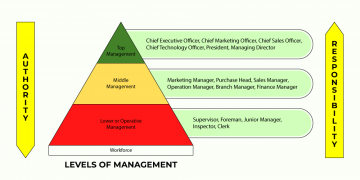
Managing Upwards: 4 Ways To Get Your Boss To “Yes”
Are you afraid to ask your boss for approval for that project you have been dreaming of bringing to life?
The ability to influence your boss is a crucial part of a high-flying career.
Learning the art of influencing your peers and other stakeholders is a skill that we’ve looked at in previous articles on influencing.
In this article, we will look at how you can develop the skill of influencing upwards to build an excellent relationship with your manager.
Managing upwards will get you more “yes” from your manager and make you more influential throughout your organisation.
Managing upwards is a key skill to becoming a line manager. For more, check out our line manager courses.
What Is Managing Upwards?
Managing upwards is looking for ways to make your boss’ job more straightforward.
It means understanding your boss’ responsibilities and helping them accomplish what is expected of them.
Managers manage down, helping subordinates achieve what is required.
Managing upwards is the same concept applied to your boss.
Obviously, it is a great way to develop your relationship with your boss.
For more detail on managing upwards, see this excellent HBR article.
The Benefits of Managing Upwards?
Managing upwards done well can be compared to having the wind at your back at work. Everything seems to go that little bit more smoothly.
Developing solid and constructive relationships with those senior to you will offer benefits throughout your career.
Having the ear of senior management allows you to get buy-in for your ideas and projects much more quickly.
Other benefits include:
- Increased recognition and faster promotion
Improved visibility with senior management is likely to lead to more explicit recognition of your achievements and rapid promotion.
- Improved Productivity and Job Satisfaction
Happy people are generally more productive and more satisfied.
Having a good relationship with your manager will remove one of the main possibilities for stress and unhappiness at work.
4 Proven Ways to Manage Upwards Effectively
1. Understand Your Boss
You need to be on the same page as your manager to influence him/her positively.
Spend a little time trying to understand what makes them tick. Everyone is different.
Do they like detailed reports, or do they prefer a summary?
Email or phone? Most people have a preference for one or the other.
Understanding these types of things will make things run more smoothly between you.
If this is something you struggle with, this article on how to manage up no matter what type your boss is is definitely for you.
2. Find Where Your Manager’s Issues Meet Your Career Goals
Find out what your manager’s key issues are.
Then look at your career goals and see if you can find out where they overlap. That is a great place to start managing up.
You can’t help with all of your bosses goals. You have to choose where you can best help them.
Suppose you can find an area where there is an overlap with your goals. That’s the place to start. You’ll be most motivated.
For example, if one of your goals is to improve your data skills and your boss has a problem with reporting and data, that’s an area to focus.
You’ll effectively be ‘killing two birds with one stone‘.
3. Listening
Learning to listen is essential to managing upwards.
Things change, and your manager’s priorities will change with them.
Listening means you will be able to adjust your approach as things change.
4. Be Reliable
Results speak louder than words.
If you deliver consistently for your boss, they will notice. Reliable, dependable team members are always highly valued.
Your boss will be able to trust you to deliver.
If you do what you say you will, your manager will increasingly listen carefully to your opinions.
Top 3 Mistakes People Make When Managing Upwards
1. Trying to Take Over
Managing upwards is not the same as taking over your boss’s position in the company.
It doesn’t mean assuming 100% of your boss’ responsibility. It means understanding the issues your manager is facing and suggesting and/or implementing fixes for SOME of them.
It’s important to know the difference between roles, you can check out our guide for exactly what a line manager is here!
2. Being Pushy with Your Suggestions
Remember, you don’t know all of the issues and tradeoffs that your boss is facing.
When you come up with suggestions, present them as that.
Don’t be overconfident. There is probably plenty that you don’t know about the situation.
If you try to force your ideas on your manager, they will understandably resent this and push back.
For more advice on how to present your ideas to your boss, see this article. https://hbr.org/2014/12/your-boss-wont-say-yes-if-emotions-are-running-high
3. Not Varying Your Approach
You need to tailor your approach to different people.
Just because an approach has worked in the past with a previous manager, that doesn’t mean it will work in the future.
Conclusion
Managing upwards is influencing, it isn’t manipulative.
It is simply putting yourself in your manager’s shoes and then thinking about how you can help them to meet their targets.
This will make you a more valuable employee and increase your influence as a result.
Next time you’re in a meeting with your boss, look for clues as to what is concerning them. Give them some suggestions for ways that you could help them improve things, and see how they react.
I bet they’ll be delighted.
Do this a few times and deliver on your suggestions, and they’ll start to see you in a whole new light.
Image Credits: Burst, Pexels, Pexels
Looking for more line manager tips? Read our guide to decision making here!




